Unleash data potential with AI-driven surveys
Improve decision-making and save up to 90% of time with AI tools for survey generation, data analysis and recommendations.
- 14 days free
- No credit card required




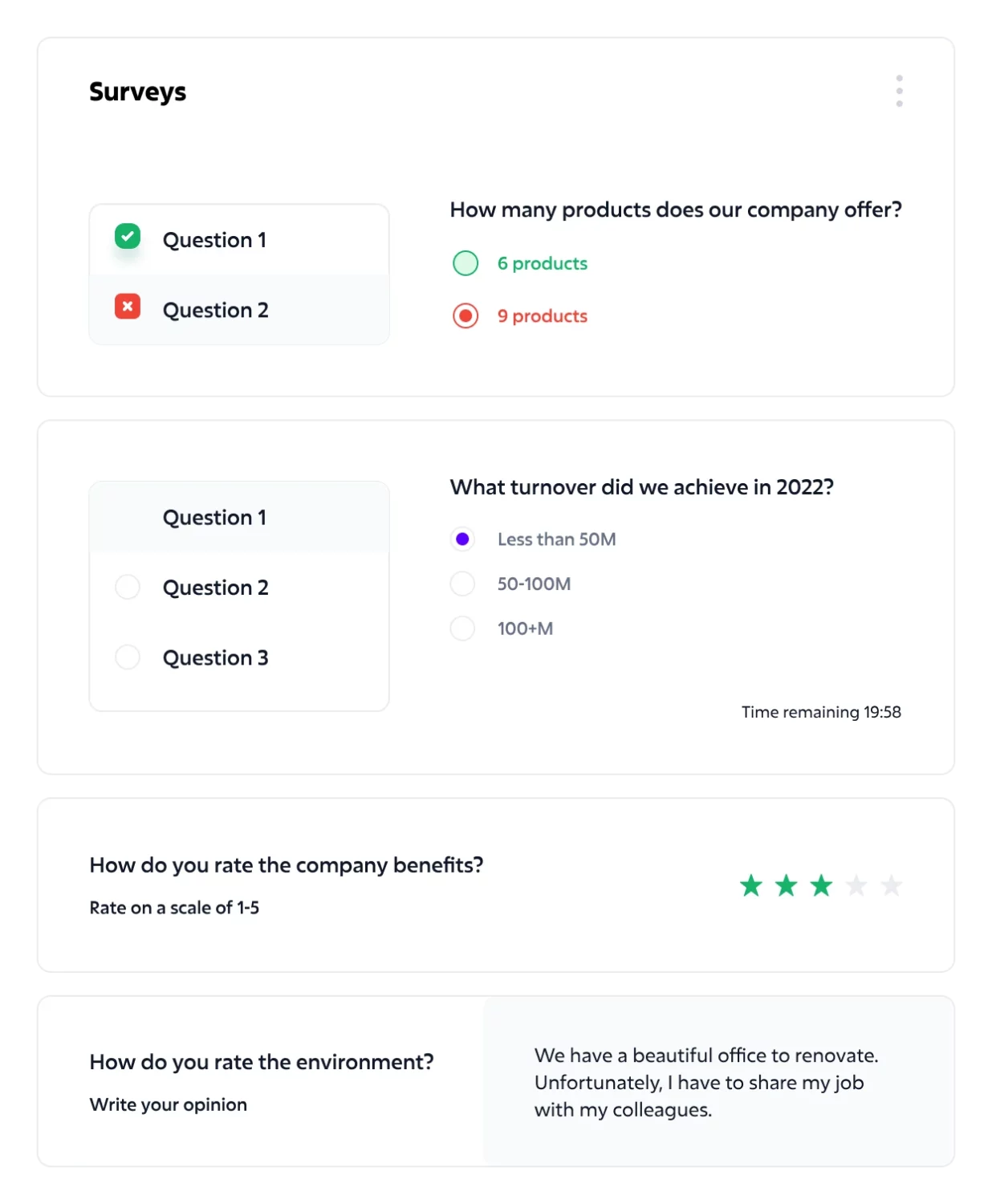
Survey creation
Get the ability to create surveys tailored to your needs
Let your employees vote on important company decisions, solve problems, get feedback.
-
Anonymous / public
-
These are also multiple choice
-
Checkbox
-
Rating (0-5..)
-
Open answer
-
eNPS
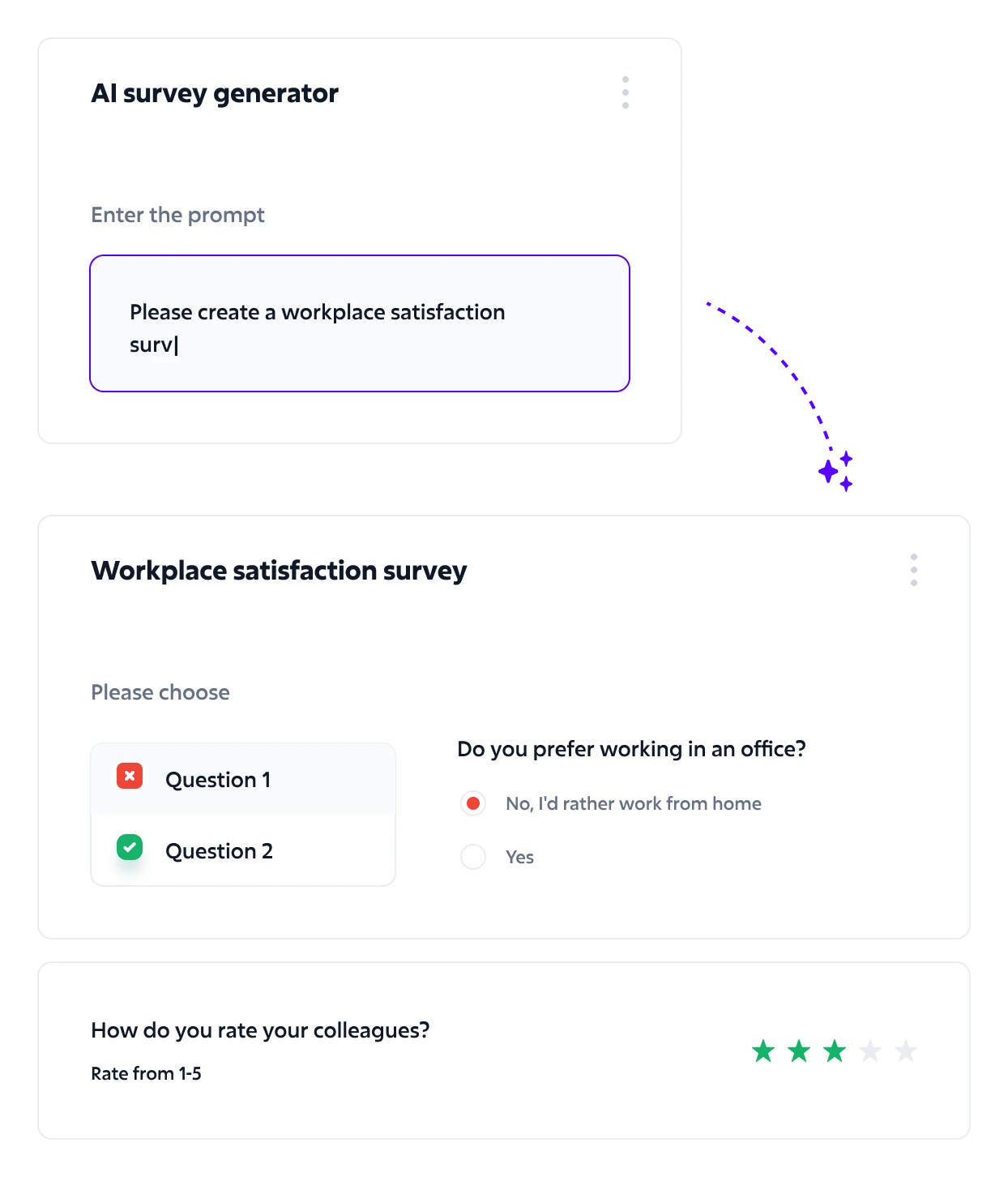
AI generation
Save up to 90% time with AI survey generation tools
With AI, you can create surveys in seconds - just type in what you need. The AI does the rest for you.
-
Thousands of tested prompts
-
Maximum optimised parameters
-
Multilingual processing
-
AI-driven smart scheduling for better engagement
-
99% processing success rate
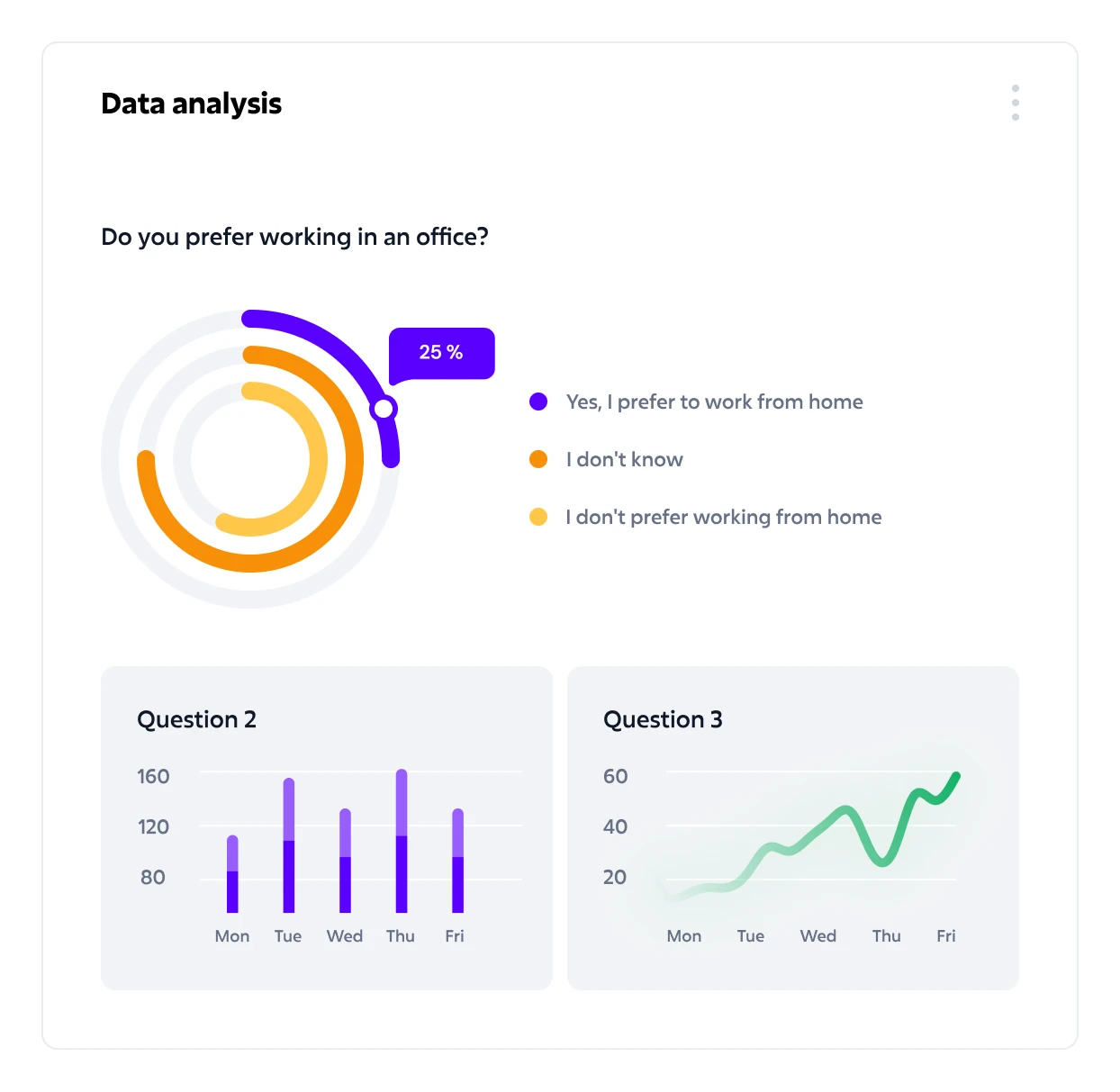
Data analysis
The results of the survey can be found in clear graphs
We visualize the data from the survey for you in clear graphs in the "analytics" tab.
-
Filter results by team and location
-
Overview of individual and team involvement
-
Export to csv, svg, png
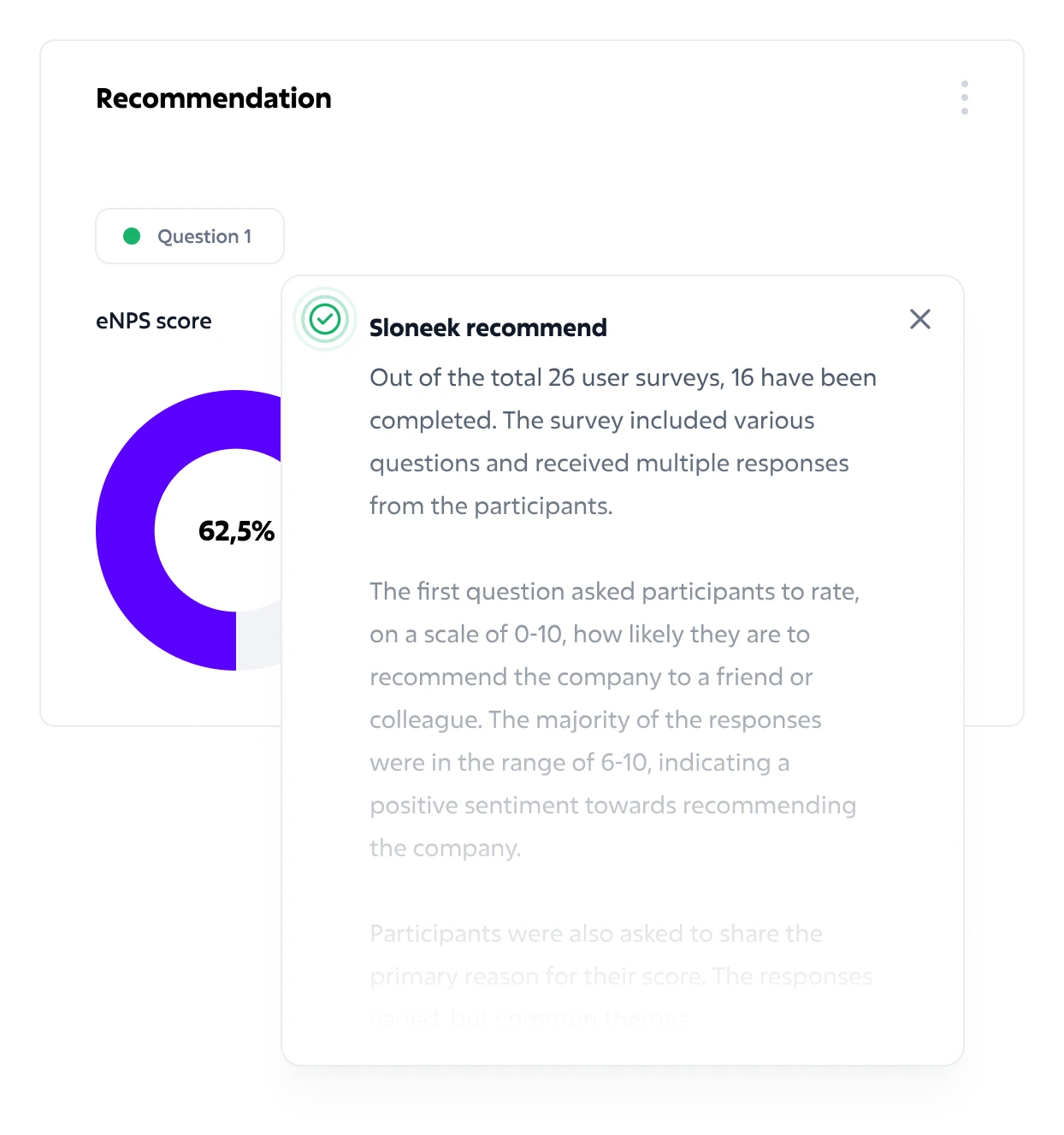
Recommendations
Get smart recommendations based on survey data
Replace the tool with a solution. AI will provide you with solution suggestions from the data for evaluation and processing of the results.
-
Summary and evaluation of results
-
Data interpretation and solution design
-
Long-term trend prediction
We are here for you
Can we help you?
Our experts will answer questions, show you Sloneek, and help modernize your HR.
- Superior onboarding
- Introduction of all functionalities
- Presentation and offer tailored to your HR
- Answer any questions




Leave us your contact details, we will get back to you.
HR surveys: a strategic approach to improving workplace dynamics
In this comprehensive guide, we explore the world of HR surveys, uncovering their importance, mechanisms and the transformational impact they can have on an organisation’s success.
From traditional to cutting-edge, we dive into different types of employee surveys, including the revolutionary integration of AI-driven solutions. J
Join us on this journey as we walk through the why, how, and when of implementing HR surveys, ultimately enabling your organization to build a workplace that thrives on engagement, satisfaction, and continuous improvement.
What are HR surveys?
HR surveys are powerful tools for gaining insight into different aspects of the employee experience.
In this handbook, we will explore their multifaceted nature, revealing their purpose and mechanisms. We will also highlight the compelling reasons why organizations turn to employee surveys as indispensable tools for organizational growth and development.
What are HR surveys for?
HR surveys serve as strategic tools for organizations seeking a comprehensive understanding of their workforce.
These surveys are targeted tools designed to uncover employee sentiment, measure job satisfaction and identify potential areas for improvement. Through the lens of HR surveys, organizations can identify specific pain points, address issues and foster a culture of continuous improvement.
From
- assessing employee engagement
- evaluating the effectiveness of HR policies
- or identifying training needs,
These surveys offer practical insights that pave the way for informed decision-making and proactive HR strategies.
In essence, HR surveys are an invaluable tool for supporting a workplace that thrives through transparency, communication and responsiveness to the changing needs of its employees.
How do HR surveys work?
Use of different question formats, such as
- choice of multiple options
- open ended
- and scaled responses,
These surveys provide a fine-grained understanding of employee perceptions.
The process usually begins with carefully crafting survey questions that align with organizational goals and allow recruiters to dive into specific areas of interest.
Distribution methods vary, from online platforms to traditional paper surveys, offering flexibility for different work environments.
Timing is critical, with surveys strategically managed to capture relevant feedback, whether after a significant event or during routine checks.
The anonymity often provided to respondents encourages honest responses and encourages employees to express their thoughts openly.
Once the responses are collected, HR teams use advanced analytics tools to analyze the data and uncover patterns and trends that might otherwise go unnoticed.
This analytical phase transforms raw feedback into useful information and guides HR professionals in making informed decisions to improve workplace satisfaction and productivity.
Why use employee surveys?
By using the collective voice of the workforce, these surveys provide direct communication between employees and management and foster a culture of inclusiveness and engagement.
One of the key motivators for using employee surveys is the ability to identify areas for improvement and levels of satisfaction in the workplace.
This proactive approach enables organisations to resolve issues quickly, leading to increased employee morale and a positive working environment.
Employee surveys play a key role in measuring the effectiveness of HR initiatives and ensuring that policies and practices are relevant to the evolving needs of the workforce.
Conducting employee surveys signals a commitment to transparency and a genuine interest in understanding the employee experience. This in turn builds trust and strengthens the employer-employee relationship.
Ultimately, the decision to use employee surveys becomes a strategic investment in nurturing a workplace where employees feel heard, valued and integral to the success of the organization.
The importance of HR surveys for companies
HR surveys serve as catalysts for positive change and offer organisations a structured approach to understanding and addressing the needs of their employees.
By providing access to valuable insights, HR surveys enable companies to make informed decisions, foster a culture of continuous improvement and ultimately promote success in an ever-evolving business environment.
What are the benefits of implementing surveys for HR?
Measuring employee engagement: HR surveys act as powerful tools for measuring employee engagement and provide a tangible metric for assessing the overall health of an organizational culture.
Real-time satisfaction statistics: offer real-time information on employee satisfaction and help HR managers identify areas of strength and potential improvement, which in turn contributes to increased employee retention and loyalty.
Informed talent development: data from surveys helps shape targeted talent development initiatives, ensures that training programmes are relevant to employees’ specific needs and aspirations, and supports a skilled and motivated workforce.
When do you need to introduce employee surveys?
When is the right time to introduce employee surveys and in which scenarios can they have the most significant impact on the dynamics of an organisation? Delving into these considerations opens up avenues for strategic implementation and fosters an environment where employee engagement thrives.
Strategic checkpoints
At strategic checkpoints such as organizational changes, mergers or expansions, employee surveys become indispensable. These pivotal moments require a comprehensive understanding of employee feelings in order to successfully navigate through transformational events.
The knowledge gained during these critical situations not only leads to strategic decision-making but also ensures a harmonious transition for the workforce.
Period of change
Employee surveys are invaluable in times of change, whether it is a change in leadership, organisational restructuring or the introduction of new policies. These surveys act as a valuable benchmark, offering insight into how the workforce is adapting to change and highlighting areas that may require additional support or better communication.
Problem solving during these transitional phases promotes a sense of stability and confidence.
Routine check-in
Regular employee surveys establish an ongoing dialogue between management and employees. These routine checks provide a pulse check on the organizational climate and help organizations remain agile and responsive to evolving employee needs.
This proactive approach to engagement not only strengthens the employer-employee relationship, but also ensures that organizational strategies are aligned with the dynamic expectations of the workforce.
Post-initiative assessment
Post-initiative evaluations are essential for organizations trying to measure the impact of new HR initiatives or policies. Post-implementation surveys allow organisations to assess the effectiveness of changes and guide adjustments and improvements.
This iterative process ensures that organisational changes are in line with employee expectations, contribute to overall satisfaction and foster a culture of continuous improvement.
AI surveys
AI surveys mark a significant leap in the evolution of HR practices in the high-tech era.
Harnessing the power of artificial intelligence, these surveys offer a simplified and efficient approach to gathering employee feedback and provide an innovative solution to modern HR challenges.
What are the benefits of implementing AI-driven HR surveys?
The benefits of implementing AI-driven HR surveys go far beyond effective data collection and analysis. In essence, these surveys usher in a new era of strategic human resource management by offering:
Improved data collection and analysis: the implementation of artificial intelligence introduces a transformative shift towards predictive HR. By using sophisticated algorithms, professionals can anticipate potential problems before they occur.
This predictive capability not only enables proactive problem solving, but also instills a progressive organizational culture that is attuned to the ever-evolving needs of the workforce.
Predictive capabilities of proactive HR: The speed and accuracy of AI-driven HR surveys are redefined by the data collection and analysis environment. Real-time insights into employee sentiment provide a dynamic understanding of the current state of the workforce.
This adaptability ensures that HR strategies are responsive to the nuanced and ever-changing dynamics within the organisation.
The impact of automation on HR effectiveness: in addition to speeding up data-related processes, the integration of automation into AI-driven HR surveys represents a paradigm shift in HR effectiveness. Repetitive and time-consuming tasks are automated, freeing up valuable resources.
The combination of predictive capabilities, adaptive insights, and effective efficiency puts AI-driven HR surveys as a cornerstone in shaping the future of strategic HR management.
When organisations embrace these technological advances, they embark on a journey of transformation where innovation converges with action.
e results and HR proves to be a proactive force leading to the success of the organisation.
Types of employee surveys
HR surveys serve as invaluable tools for organizations aiming to increase employee satisfaction, improve organizational culture and promote professional development.
Let’s explore the diverse landscape of employee surveys and categorize them by their primary focus areas.
Onboarding & Experience Surveys
Recruitment survey
An employee’s onboarding experience sets the tone for their entire tenure.
Recruitment surveys play a key role in measuring the effectiveness of the recruitment process, identifying areas for improvement and ensuring that new employees feel welcome and adequately supported from day one.
Employee engagement surveys
Employee engagement is the cornerstone of an organisation’s success.
These surveys delve into the emotional relationship employees have with their work and reveal the factors that contribute to motivation, job satisfaction and overall commitment to the organization.
Organisational culture surveys
The culture of an organisation shapes its identity. Organisational culture surveys assess the prevailing values, beliefs and behaviours within a company.
By understanding culture, organizations can align strategies and initiatives with the shared values of their employees.
Employee experience surveys
Employee experience surveys offer a holistic view of the entire employment journey.
From onboarding to the day-to-day work experience, these surveys capture the multifaceted aspects of employee interactions with the organization and provide insights for comprehensive improvement.
Satisfaction and improvement surveys
Employee satisfaction surveys
Measuring overall employee satisfaction is a fundamental aspect of HR.
These surveys measure how satisfied employees are with various aspects of their job, such as compensation, work environment and opportunities for growth.
Employee attitude surveys
Understanding employee attitudes is essential for effective management. These surveys delve into the mindset of employees, revealing perceptions, feelings and potential areas where attitude adjustment can be beneficial.
Employer improvement surveys
Continuous improvement is a hallmark of successful organisations.
Employer improvement surveys focus on soliciting suggestions and feedback from employees to identify areas where the organization can improve policies, processes and the overall work experience.
Employee health surveys
Employee well-being is an integral part of productivity and satisfaction.
Surveys in this category assess the physical, mental and emotional well-being of employees and provide information to shape wellness programs and initiatives.
Performance and development surveys
Employee performance surveys
Evaluating individual performance is essential for both employees and organisations.
Performance surveys provide a structured approach to gathering feedback on an employee’s achievements, strengths and areas for improvement.
Professional development surveys
Employee growth contributes to organizational success.
Professional development surveys help identify training and skills development opportunities that employees are looking for and align individual aspirations with organisational goals.
Location surveys
Matching skills and strengths to job requirements is critical to employee success.
Job fit surveys assess how well employees believe their skills match their current roles, which helps in optimising job tasks.
KPI-driven surveys
Key Performance Indicators (KPIs) are essential for evaluating the success of an organisation. KPI-aligned surveys provide a quantitative approach to measuring employee contributions to strategic objectives.
Custom and comprehensive surveys
Survey 360
360-degree feedback provides a comprehensive view of employee performance.
This survey gathers insights not only from supervisors, but also from colleagues, subordinates and even external stakeholders, promoting an all-round understanding.
Overall business surveys
These surveys take a macroscopic approach and assess employee perspectives on overarching business strategies, goals and alignment with the company’s mission.
Cross-departmental surveys
Collaboration across departments is essential to the success of an organisation.
Cross-departmental surveys measure how well teams collaborate and communicate, and identify opportunities for better cohesion.
Own surveys
Customized surveys tailored to the specific needs of the organization provide flexibility to address unique challenges and ensure that the survey instrument accurately matches the goals and nuances of the organization’s HR strategy.
Final thoughts
Finally, this guide illuminates the multifaceted landscape of HR surveys and demonstrates their crucial role in organizational success.
From understanding their mechanisms to exploring the benefits of AI integration and categorizing different types of employee survival
Organizations now have the knowledge to strategically implement surveys that drive engagement, satisfaction and continuous improvement.


